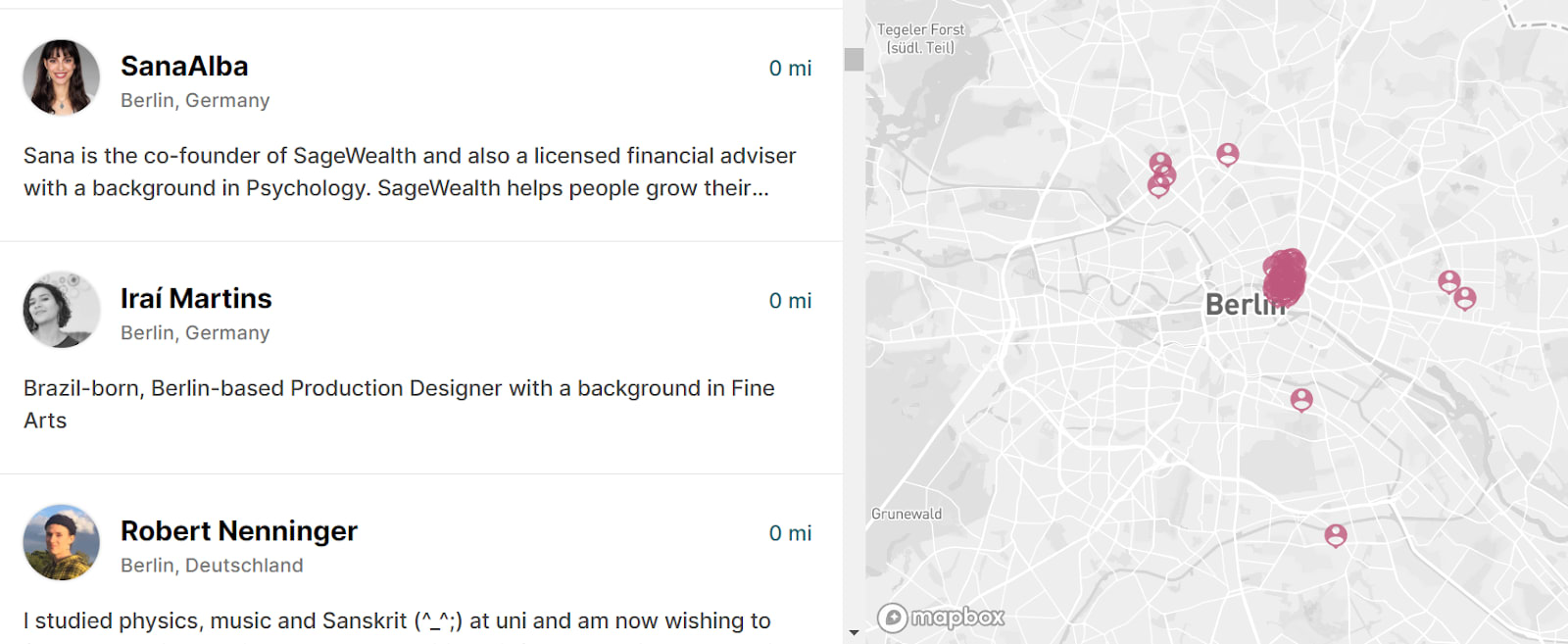TLDR: Consider indicating your approximate location on the EA forum community members map, so local organizers can find you, and maybe take initiative yourself to organize lunch meetups, walks, coworking, anything else you want, all within 10min of where you live or work.
Many EA community members (myself included) would like to meet others with shared interests more often without the hassle of long commutes. In EA Hubs like London or Berlin, 30-45min+ commutes to meet other members from your “local” city group are not unusual, which makes shorter meetups like lunches or afternoon walks not feasible. To address this, I’m proposing Neighborhood EA meetups (or “actually local groups”, if you will).
First, we need a way to find out who lives in your neighborhood. I suggest we use the existing EA forum community members map. Here in Berlin, a few people already specified their locations (approximately, for privacy reasons), but most just put in “Berlin” and are displayed in the city center instead.
Building EA flatshare clusters
This map can also be helpful when deciding where to move, or where to book accommodation when visiting. Here in Berlin, we already have a cluster of EA flatshares in Wedding (northwest), around the EA coworking space Teamwork, and there might be potential for a second cluster in Eastern Berlin (Friedrichshain, Kreuzberg, Neukölln) and maybe also Northeast (Prenzlauer Berg). Such clusters could start their own local (neighborhood) chat groups to coordinate coworking, plan events, help others find flats in the area, and more. Message me (for Berlin) or your local EA group organizer, if you'd like to set up or join neighborhood chat groups.
Take the first step now (2min)
If you want to help build a cluster, or just be invited to local events and hangouts, I recommend you:
Update your location on your EA Forum profile (30 seconds)
Keep in mind that profiles are public, for privacy reasons I’d recommend not to put in your full address but just your zip code or a nearby landmark such as the closest subway station. Anything within 300m (1000ft) should work.
Make your profile more approachable (1-5min)
Upload a photo, connect your Linkedin, Facebook, Insta or personal website, maybe write 1-2 sentences about your interests.
Spread the word (recommended)
To get more people to update their profiles, consider (strongly) upvoting this post for visibility, sharing it in your local EA group chat and personally with anyone who might be interested. Who's new in town? Who seems interested in meeting new people?
Take initiative! (optional)
If you want to meet fellow EAs for lunch, coworking etc, don’t wait for others to do it, but start organizing it yourself. Be the change you want to see. :)
Either just pick a date, time and place and then invite 5+ people, or confirm a date with one other person (maybe someone you already know) and then invite everyone else. Don’t overthink it, worst case people just decline or don’t respond. In my experience, people generally appreciate being invited, even if they can’t make it.
I’ll start (feel free to use this as template):
I’d be happy to (co-)organize lunches at ~1pm in Berlin-Wedding at my place (near Schäfersee) or at/near Teamwork, the EA coworking space. If you’re interested, update your EA forum profile and message me on Linkedin (preferred), Telegram or Signal. If enough people express interest, I’ll organize it.
For those more motivated and ambitious, this could be the first step to building a friends / community cluster like Priya did in New York, see her Substack article "How to Live Near Your Friends Twenty-two of my friends live within walking distance of me".
What else might help facilitate local connections? Share ideas and experiences in the comments, or message me on Linkedin (preferred) or here on the forum. I'm happy to connect with fellow community builders and spar ideas!




I also want to give a shout out to the EA Anywhere community for those of us that don't have neighborhoods. EA Anywhere's Slack workspace isn't as nice as living within walking distance of friends or getting together for lunch, but it is a really nice little community for those of us that would otherwise require a bus, two flights, and a train to meet in-person.
An additional upside: people from a variety of countries and cultures are there. If I recall correctly, the people who founded and ran EA Anywhere were from three very different countries.